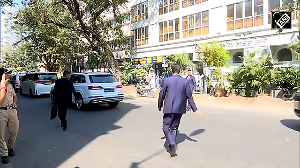While stock market indices are rising, UTI Asset Management Company chairman and managing director U K Sinha says that risk appetite at the retail level is low. In an interview with Sidhartha, he speaks about India's oldest mutual fund's capital-raising plans and suggests a roadmap for reforms in the sector. Excerpts:
From being the largest mutual fund, you are now at the fourth slot. What are you doing to claw back up?
In March 2003, when the company was set up, we had a market share of 17 per cent, which dropped to 10.5 per cent towards the end of 2005. In the equities space too, we had a market share of 48 per cent in March 2003, which fell to around 10 per cent around the end of 2005.
But now that decline has been arrested. We have around 9.9 per cent share of the market and around 13 per cent in the equities segment. In that sense, the share is increasing but yes, there has been a decline.
Meanwhile, what has also happened is that some of the AMCs have opted for aggressive growth. In the process, they have focused on liquid funds, while our focus has remained on equity and balanced funds. We have focused on revenue-earning and long-term assets.
We have opted for a strategy that makes the company more financially sound and more profitable compared to others who are only growing in size.
Besides, everyone in the top 10 is part of a business group, while UTI is the only pure-play AMC. My competitors are part of large conglomerates where they have the advantage of group money (coming to them) through banks, insurance companies, non-banking finance companies or securities firms, either foreign or public sector or private.
No promoter helps UTI AMC in gathering funds. The shareholders of UTI distribute UTI products on merit and not because of ownership.
In 2007, you stopped subscribing to papers issued by real estate companies. Has that changed?
Since November 2007, we stopped investing in real estate papers though a lot of other AMCs continued to do so till August last year. But we have not restarted investing in real estate papers.
What about NBFCs?
We are investing selectively and are limiting our exposure to NBFCs which have strong financials. In any case, demand from NBFCs was for the business of IPO (initial public offer) financing, which is not there presently because there are no public issues. We are going after quality paper.
Are there any issues with investments in certain banks?
We cannot invest in certificates of deposit (CDs) that are issued by State Bank of India, Bank of Baroda and Punjab National Bank because they are our sponsors. These CDs account for nearly 40 per cent of the market and we have taken up the issue with Sebi (Securities and Exchange Board of India).
Is there a revival in investment sentiments, given that the stock markets seem to be doing better?
Investor sentiment has not improved and fresh money is not coming in a big way. There is still a preference for fixed deposits and there are no signs of improvement in the risk appetite.
So what are you doing?
The strategy is to reach out to people through specific campaigns and investor education. We are also trying to sell balanced schemes, be it retirement plans, children-related schemes and Ulips.
We have tied up with Basix and the Tower group which has some 100,000 members. Balanced funds, with reasonable safety and reasonable equity exposure, are the focus at the moment.
What about your plans for a private placement and an IPO, since you seem to have revived them?
Towards the end of April, we again received a formal go-ahead from the government for private placement plans. Basically, the validity of the earlier proposal has been extended. We are in the process of seeking shareholder approval for that. Once we get that, the process will be completed.
We are in talks with some international players for private placement. We hope to complete the process in the next two-and-a-half months or so. We will take up the public offer later.
But why do you need capital?
We do not need any capital. Unlike the earlier plan, there is no capital which is coming to us, but it will all go to shareholders. Their stake will go down proportionately to 18.5 per cent.
What about acquisition plans, since valuations are good and capital-raising was seen as a move to acquire other fund houses?
UTI has got a past record of taking over an AMC and merging it successfully. We did it in the case of IL&FS Mutual Fund. Investor interest has been protected.
What are the reform areas that the regulator should focus on, especially in the post-October period when there was a turmoil of sorts in the mutual fund industry?
Unlike banking or insurance, the mutual fund industry does not have an unblemished record. Also, it does not have a track record for secular growth. So, the regulatory capital should be enhanced.
Otherwise there are non-serious players along with systemic risks. With Rs 10 crore (Rs 100 million) capital, if you manage Rs 50,000 crore (Rs 500 billion) or Rs 1,00,000 crore (Rs 1 trillion) and something goes wrong, there will be systemic implications and the entire market will be affected.
October was a good example of that and we should learn from it instead of looking at it as a one-off development in history.
Two, more disclosure of the portfolio -- in terms of types of account holders, whether they are corporates or retail -- should be mandated. People only know one number, which is assets under management.
But there is a need for disclosure of how much of group money is flowing in. Disclosure should be the first step and then the regulator should analyse the risk.
There is also a need to bring in transparency. Whatever is disclosed to the regulator should also be disclosed to the investors, media and analysts so that they can blow the whistle in case something is wrong.






